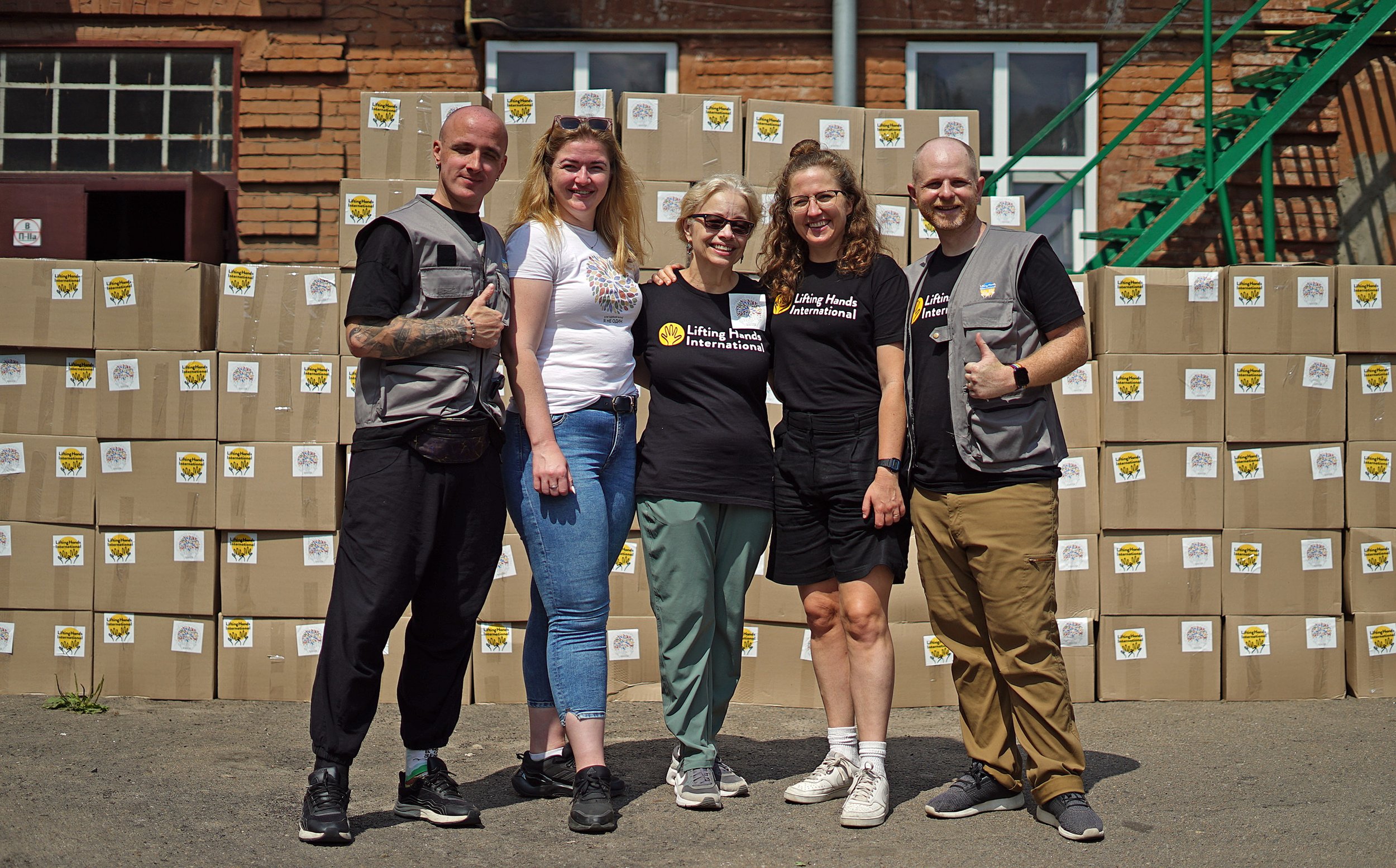By Mary Carriero, Chairperson, LHI Board of Directors
LHI Board of Directors Chairperson, Mary Carriero (center in sunglasses), traveled with members of the LHI crew to Jordan and Ukraine to check in on our operations there.
It was a genuine privilege to accompany Hayley Smith, LHI Founder and Director, and Walker Frahm, LHI COO, on a recent trip to visit LHI’s programs in Jordan and Ukraine. In both countries, the needs LHI is addressing are visible, raw and immediate.
While in Jordan, Mary (pictured in a pink hat) helped inspect each goat to be distributed.
On our first stop, Jordan, I immediately saw how desperately the goats we distribute are needed by Syrian refugee families. Goats are in such demand because owning goats so significantly improves quality of life for Syrian refugees in Jordan. In tents and homes, we were offered milk, yogurt and cheese that had all come from the goats. A family spoke of saving the money they earned from selling goat dairy products to pay for surgery needed for their young son’s eye. These are refugee families that have lived in camps for 10+ years. For them, goats are part of a path to a better, sustainable future.
When we arrived in Ukraine, I reflected that appearances can be deceiving. On the surface, Lviv resembles any number of other beautiful, old European cities. But a few weeks before we visited, Lviv was directly attacked by Russian shelling. When we checked into our hotel, we were told the hours for breakfast, the location of the hotel restaurant—and the location of the hotel bomb shelter.
Ongoing attacks force ordinary Ukrainians to make tough choices. Hayley and I were with one of our partners as she dropped her daughter off to stay with family outside of Lviv—she considered it safer than having her daughter with her in the city. Another partner, whose wife had recently given birth, spoke of women in labor at the local hospital needing to be moved to the basement for safety during the attack—and that is where some women gave birth. And, on our bus out of Ukraine to Poland, we sat behind a young mother and her two young children, all in tears as they said goodbye to their father. He, like most Ukrainian men between the ages of 18 and 60, cannot legally leave the country because of a general mobilization order.
Mary (left) visited the LHI Women’s Shelter in Ukraine with LHI Founder and Director Hayley Smith and LHI COO Walker Frahm.
The psychological and physical impact of the ongoing war across the whole of Ukraine’s population is enormous. But LHI is making a real difference in the lives of Ukrainians via services such as food distribution to internally displaced persons (IDPs), psychological support programs, and a shelter providing housing for those needing assistance.
One consistent element in both Jordan and Ukraine was the complete commitment, dedication, and generosity of our local teams. As I met with members of these groups in person, I saw first-hand the strengths of LHI’s model of utilizing locals to get the work done. Each team is intimately familiar with, and personally involved in, assessing needs and providing aid. Our local teams work creatively, collaboratively, and tirelessly to provide solutions that are tailored to these needs, emphasizing stability and sustainability. On a personal level, each group went out of their way to welcome our team with meals, fellowship and smiles.
Mary helped prepare food boxes for distribution to displaced families in Ukraine.
I can’t close this note without touching on the laughter and communion that provide moments of joy throughout this trip. Whether it was sharing underground dining, a theme that ran throughout the trip (we ate in a cave, a WWII bunker and the basement shelter), or the many hours spent in a bus twilight zone (if you know, you know), or desperately seeking 30 Polish groszy (to be able to use the bathroom in the aforementioned twilight zone), this was a group of people who were able to find the humor in everything. When the situations you are witnessing can be so intense, laughter becomes a true gift.
Mary (left) shares a meal with LHI Founder and Director Hayley (2nd from left) and the rest of the LHI crew at the LHI Women’s Shelter in Ukraine.
This trip made a lifetime of difference to me. The key takeaway I came home with is how directly impactful LHI’s work is. I don’t think anyone can have this experience without coming away with a tremendous sense of pride in all that the entire LHI team is doing and has accomplished.
Thank you LHI!












